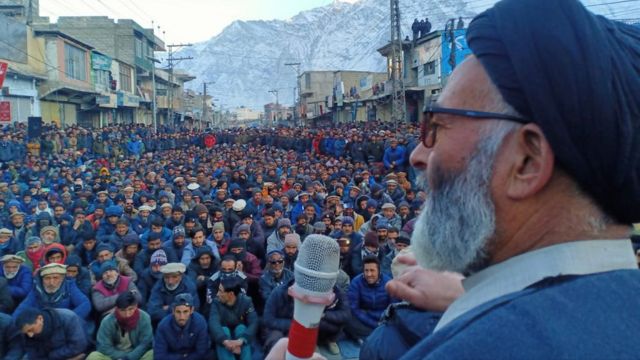https://bitterwinter.org/here-we-ar...ested-in-pakistan-based-on-new-blasphemy-law/
 Arrested: Shiite cleric Agha Baqir Al Hussaini. From Facebook.
Arrested: Shiite cleric Agha Baqir Al Hussaini. From Facebook.
We wish we had been wrong. But we weren’t. After a test case against a Sunni retired teacher, Pakistan amended last month Article 298-A of its Criminal Code, which is part of its blasphemy laws and punishes those who disrespect “the Prophet’s wives, family, close companions, and the Righteous Caliphs.” The penalty passed from one month to three years in jail to a minimum of ten years to life imprisonment, plus a fine of one million rupees.
“Bitter Winter” reported that the government had amended Article 298-A under pressure from radical anti-Shiite Sunni movements, and that Shiites would risk severe jail penalties. In fact, in Shia literature one can find curses against Aisha, the third and youngest wife of Muhammad, for her role in denying that Ali, whom the Shiites regard as their founder, was the legitimate successor of the Prophet, and against those companions of the Prophet who sided against Ali.
We were not alarmist, and what we denounced as a possibility has already happened, as soon as the new law entered into force. A prominent Shiite cleric, Agha Baqir al-Hussaini, was arrested in Skardu, the largest city in the Gilgit-Baltistan region.
He had presided a meeting in mid-August denouncing the new law and stating that Shiites cannot and will not renounce their criticism of those relatives and companions of the Prophet who denied Ali’s succession. As a result, on August 22, local Sunnis took to the street demanding his arrest.
The Shiite cleric was arrested at the end of August. The arrest generated new and larger protests in Skardu, this time by Shiites. It was the largest protest in the history of the city of Skardu.
 Massive protests by Shiites in Skardu supporting Agha Baqir Al Hussaini. From Twitter.
Massive protests by Shiites in Skardu supporting Agha Baqir Al Hussaini. From Twitter.
Demonstrations became national, as documented on social media, creating a serious risk of sectarian violence.
All this was highly predictable when the blasphemy law was amended. However, the Pakistani government preferred to humor the radical fundamentalists of Tehreek-e-Labbaik Pakistan rather than protecting religious minorities and avoid inter-Islamic conflict.
 Another image of the Shiite protests. From Twitter.
Another image of the Shiite protests. From Twitter.
“Bitter Winter” correctly predicted that new penalties against those who “offend the wives and companions of the Prophet” were intended for cracking down on Shiites.
by Massimo Introvigne
We wish we had been wrong. But we weren’t. After a test case against a Sunni retired teacher, Pakistan amended last month Article 298-A of its Criminal Code, which is part of its blasphemy laws and punishes those who disrespect “the Prophet’s wives, family, close companions, and the Righteous Caliphs.” The penalty passed from one month to three years in jail to a minimum of ten years to life imprisonment, plus a fine of one million rupees.
“Bitter Winter” reported that the government had amended Article 298-A under pressure from radical anti-Shiite Sunni movements, and that Shiites would risk severe jail penalties. In fact, in Shia literature one can find curses against Aisha, the third and youngest wife of Muhammad, for her role in denying that Ali, whom the Shiites regard as their founder, was the legitimate successor of the Prophet, and against those companions of the Prophet who sided against Ali.
We were not alarmist, and what we denounced as a possibility has already happened, as soon as the new law entered into force. A prominent Shiite cleric, Agha Baqir al-Hussaini, was arrested in Skardu, the largest city in the Gilgit-Baltistan region.
He had presided a meeting in mid-August denouncing the new law and stating that Shiites cannot and will not renounce their criticism of those relatives and companions of the Prophet who denied Ali’s succession. As a result, on August 22, local Sunnis took to the street demanding his arrest.
The Shiite cleric was arrested at the end of August. The arrest generated new and larger protests in Skardu, this time by Shiites. It was the largest protest in the history of the city of Skardu.

Demonstrations became national, as documented on social media, creating a serious risk of sectarian violence.
All this was highly predictable when the blasphemy law was amended. However, the Pakistani government preferred to humor the radical fundamentalists of Tehreek-e-Labbaik Pakistan rather than protecting religious minorities and avoid inter-Islamic conflict.

